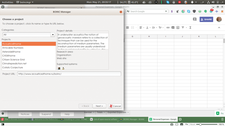Cycles for Science
BOINC

Want to participate in the scientific revolution? BOINC lets you lend your spare computer cycles to data analysis efforts for NASA and other science institutions.
Scientists collect massive amounts of data. In fact, the biggest challenge of science is sifting through all the data to come to correct and fascinating conclusions. This is where you come in: If you want to help with the march of science, you could give your life to NASA or a large university, or you could just contribute some cycles from your home computer. One of the easiest ways to contribute to science is to let your computer crunch the numbers for ongoing scientific experiments.
It all started with the search for extraterrestrial intelligence (SETI). SETI scientists built a radio telescope to scan the skies for radio signals that could come from civilizations like ours. The big problem quickly became obvious; analyzing the data takes immense amounts of computing power. To address this problem, the team adapted the software they use to analyze the signal to run on a PC. Then they came up with a brilliant idea: make small work packages that anyone can compute in any order. Users can download the packages and analyze the data off-line. This client was then shared on their website, the best part: they designed it so users could use the software as a screen saver.
The popularity of the project exceeded their expectations, and the team quickly realized that the system could work for other projects also. However, other projects such as medical research and astronomy needed other mathematics. The solution was Berkeley Open Infrastructure for Network Computing, BOINC [1].
[...]
Buy this article as PDF
(incl. VAT)
Buy Linux Magazine
Subscribe to our Linux Newsletters
Find Linux and Open Source Jobs
Subscribe to our ADMIN Newsletters
Support Our Work
Linux Magazine content is made possible with support from readers like you. Please consider contributing when you’ve found an article to be beneficial.

News
-
Introducing matrixOS, an Immutable Gentoo-Based Linux Distro
It was only a matter of time before a developer decided one of the most challenging Linux distributions needed to be immutable.
-
Chaos Comes to KDE in KaOS
KaOS devs are making a major change to the distribution, and it all comes down to one system.
-
New Linux Botnet Discovered
The SSHStalker botnet uses IRC C2 to control systems via legacy Linux kernel exploits.
-
The Next Linux Kernel Turns 7.0
Linus Torvalds has announced that after Linux kernel 6.19, we'll finally reach the 7.0 iteration stage.
-
Linux From Scratch Drops SysVinit Support
LFS will no longer support SysVinit.
-
LibreOffice 26.2 Now Available
With new features, improvements, and bug fixes, LibreOffice 26.2 delivers a modern, polished office suite without compromise.
-
Linux Kernel Project Releases Project Continuity Document
What happens to Linux when there's no Linus? It's a question many of us have asked over the years, and it seems it's also on the minds of the Linux kernel project.
-
Mecha Systems Introduces Linux Handheld
Mecha Systems has revealed its Mecha Comet, a new handheld computer powered by – you guessed it – Linux.
-
MX Linux 25.1 Features Dual Init System ISO
The latest release of MX Linux caters to lovers of two different init systems and even offers instructions on how to transition.
-
Photoshop on Linux?
A developer has patched Wine so that it'll run specific versions of Photoshop that depend on Adobe Creative Cloud.
